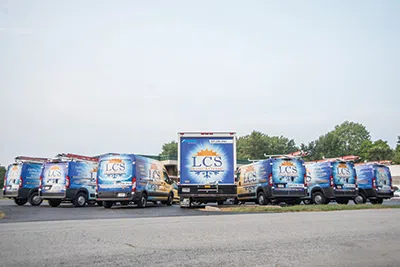Producers large and small see home-services businesses as a perfect fit.
Are electric vehicles right for your company? Many contractors are unsure, as was Tom Robichaud, owner and president of Precision Plumbing Heating Electric in Boulder, CO. The CEO of one of Precision’s long-time clients, Boulder Electric Vehicle, convinced Robichaud to take a test drive because he thought the truck would be a perfect fit for the short routes service technicians drive daily. After that test drive and some additional research, Robichaud became an electric vehicle advocate.
Rochichaud has committed to purchasing 20 vehicles for his fleet at a cost of $1.4 million, or $70,000 each.
“This is the future, and everyone needs to do their part with energy conservation,”
Robichaud said. “There is no reason why a plumber or hvacr technician can’t lead the way and set the example. The electric motor is two to five times more efficient than a diesel engine. Higher efficiency means less energy consumption. Less energy consumption means lower costs and less pollution.”
Robichaud hired Bella Energy of Louisville, CO, to install solar panels on Precision’s headquarters building to help re-charge the batteries for eight hours at night after technicians drive each truck 120 miles during the day.
Cost: Favorable Over Long Term
According to Robichaud, investing in electric vehicles represents a long-term commitment to lowering overhead costs. Although each electric-powered truck will cost Precision about $20,000 more than a traditional truck, the company plans to more than offset that difference because:
• The electric trucks should last longer. Said Robichaud: “We average 25,000 miles a year on our trucks, and they [traditional trucks] last 100,000 miles. The electric vehicle is estimated to last 300,000 miles on a [lithium-iron-phosphate] battery.”
• No gasoline or diesel costs. Precision was spending about $9,000 a month on gasoline for gasoline-powered trucks. Diesel-powered trucks required about $5,000 a month for fuel. According to Boulder Electric Vehicle, a gasoline-powered vehicle traveling 25,000 miles a year will cost $6,250 in gas (at $4 per gallon, 16 miles-per-gallon). One of its vehicles traveling the same distance will cost $1,375 (at 11 cents per kilowatt-hour, 500 watt-hours per mile.) When years, the comparison is $26,875 for gasoline versus $5,913 for electricity.
• Lower maintenance costs. There are no belts, spark plugs, oil filters or valves; and no transmission, alternator, or distributor cap in Boulder’s vehicles. They use only three fluids: differential gear oil, brake fluid and washer fluid.
Said Robichaud: “We change oil [on traditional trucks] every 6,000 miles at $150. Emissions work is $125 year, and then there are air filters and brake pads. As the vehicle gets into the third and fourth year, it is not uncommon to change the turbo at $3,000, injectors at $2,500, and an occasional transmission, brake drums, belts, and all of the unexpected miscellaneous stuff that happens. The electric vehicle has regenerative brakes, a motor, and a battery. After driving the electric vehicle, I can’t imagine that the brakes won’t last two to three times as long. The longer we drive the vehicle the more we save.”
Supporting Sustainability, Energy Conservation
Depending upon your market and unique selling position, customers could already be expecting you to be using electric vehicles. High-profile global companies such as General Electric and FedEx have committed to building electric-vehicle fleets, and more and more government groups, small businesses and consumers are using electric vehicles.
A recent study by the Union of Concerned Scientists tied the benefits of electric vehicles to how electricity is generated by region. The vehicles have the highest sustainability benefits in regions that rely on the cleanest sources to create energy. (In nearly all regions, though, electric vehicles reduce oil consumption, the group said.)
The reality of grid-generated electricity (still largely fossil based) and the promise of electricity as a replacement for fossil-based automotive fuels is one of several obstacles to widespread, coast-to-coast acceptance of electric vehicles, including plug-in hybrids. Another is a lack of public charging stations in much of the country.
But for small businesses such as Precision, switching to electric vehicles can make an immediate “green” difference because of the immediate drastic reduction in gasoline and diesel consumption and accompanying emissions; as well as less material waste in replacement parts and fluids.
For interested contractors, options are available, and more will be coming. In addition to small producers such as Boulder, global automakers are putting more emphasis on electric vehicles.
According to a report in the Los Angeles Times, at least nine electric and plug-in hybrid vehicles are expected to hit the market this year, including the already-available Nissan Leaf and Chevrolet Volt. Ford offers a variety of electric and hybrid options across its line-up, and Chrysler recently delivered four Town & Country electric mini-vans to the City of Auburn Hills, Mich., as part of an in-field study program affiliated with the U.S. Department of Energy.
At the Geneva Motor Show in March, Nissan showed off a multi-use concept vehicle called the e-NV200, which it says provides “both families and business users with unmet driving experience and best-in-class running costs.” The e-NV200 shares many of the same drive train components as the LEAF.
Tonya Vinas is a former editor of HVACR Business.


